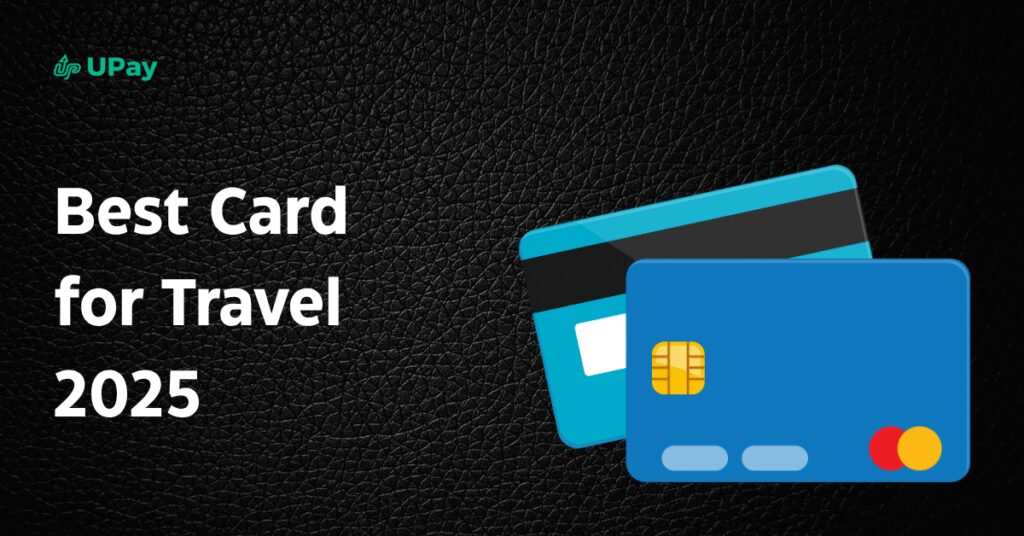Are you currently planning on travelling? You’ve gone shopping, booked your flights, and made your itinerary. Good! You have just one thing left out: A travel card! This card can make your trip much smoother and help you save money along the way.
A travel credit card is more than just a means of payment. It’s your ticket to earning points on every purchase, getting free airport lounge access, and avoiding those annoying foreign fees when you shop abroad.
Let’s examine the best travel card and determine which one works best for your next adventure.
Key Takeaway
- Travel credit cards offer more than just payment – they provide points on purchases, airport lounge access, and eliminate foreign transaction fees.
- The Chase Sapphire Preferred Card is ideal for beginners with its $95 annual fee, 60,000 points welcome bonus, and flexible point transfer options.
- American Express Gold Card excels for dining rewards with 4x points at restaurants and up to $400+ in annual statement credits for dining and rideshares.
- Capital One Venture X offers premium benefits like access to 1,300+ airport lounges worldwide and a $300 annual travel credit that offsets its $395 fee.
- Most top travel cards require good to excellent credit scores, with only a few options, like Barclaycard, available for fair credit holders.
| Cards | Annual Fees | Rewards | Credit Score | Best |
| Chase Sapphire Preferred® Card | $95 | 60,000 welcome bonus points | Good and Excellent | Card for flexible points |
| American Express® Gold Card | $325 | 1x – 4x points at restaurants. | Good – Excellent | A card for a dining experience |
| Citi Strata Premier℠ Card | $95 | 1x-10x points | Good – Excellent | Rewards for everyday spending |
| Capital One Venture Rewards Credit Card | $95 | 2x-5x points | Good – Excellent | Rewards for everyday spending |
| Capital One Venture X Rewards Credit Card | $395 | 2x-10x points | Excellent | For travel benefits |
| Barclaycard Reward Credit Card | $30 | 0.5% cashback | Fair | For UK residents. |
| Chase Sapphire Reserve® | $550 | 1x-10x points | Excellent | For Bonus rewards |
| Ink Business Preferred® Credit Card | $95 | 1x-3x points | Excellent | For small business owners |
| Wells Fargo Autograph Journey℠ Card | $95 | 1x-5x points | Good – Excellent | For earning travel rewards |
| Chase Freedom Unlimited® | $0 | 1.5%-5% cashback | Good – Excellent | For budget-conscious travelers |
10 Best Cards for Travel 2025
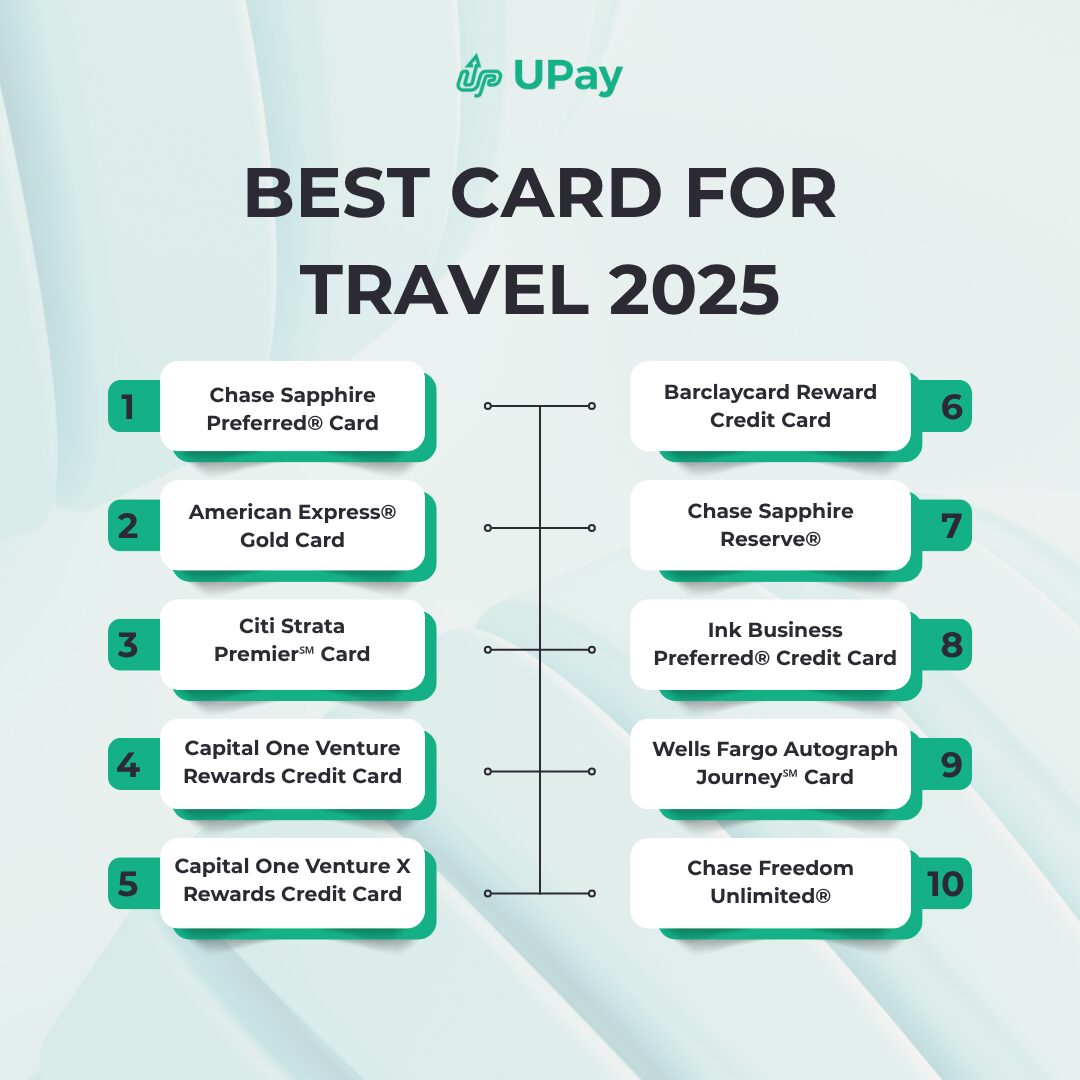
I will be reviewing the 10 best cards for travel in 2025. I’ll explain what makes each card special, what they cost, and how much value you can get from them. This will help you pick the best travel card for your needs and spending habits.
Chase Sapphire Preferred® Card
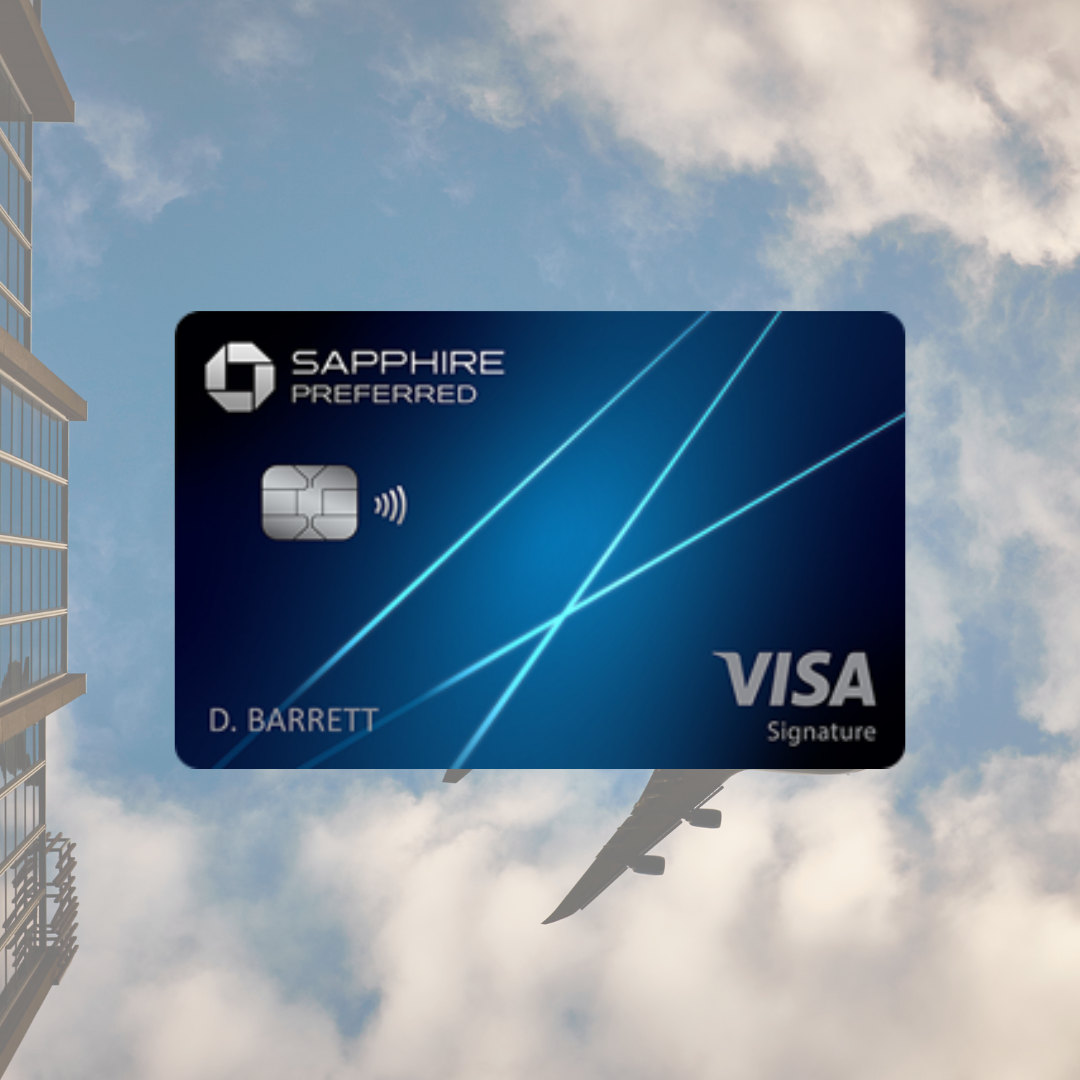
If this is your first time getting a travel card, this is the best for you. The Chase Sapphire Preferred® Card has been helping people earn travel rewards for over 10 years, and it’s still one of the top choices today.
Best: Card for flexible points.
Rewards: 60,000 welcome bonus points
Credit score needed: Good and Excellent.
Annual fees: $95
Pros
- Earn 5X points on travel booked through Chase, 3X on dining, streaming, and groceries, 2X on other travel, 1X on everything else
- Big 60,000-point bonus after spending $5,000 in the first 3 months
- Points are worth 25% more when used for travel through Chase
- Transfer points to many airline and hotel partners
- Up to a $50 hotel credit yearly for bookings through Chase
- Good travel protections like trip cancellation and rental car insurance
- No foreign transaction fees
Cons
- $95 annual fee
- Best rewards require booking travel through Chase Travel, not direct or other sites
- No credit for TSA PreCheck or Global Entry fees
- Some no-fee Chase cards offer decent rewards, but without transfer options or travel perks
American Express® Gold Card

This card shines when it comes to earning points on everyday spending. It gives you lots of points when you spend at restaurants worldwide and U.S. supermarkets.
You also earn extra points on flights booked directly with airlines. It comes with useful credits for Uber, Dunkin’, dining, and Resy, which can save you money.
Best: Card for dining experience
Rewards: 1x – 4x points at restaurants.
Credit score needed: Good – Excellent
Annual fees: $325
Pros
- Earn 4X points at restaurants (up to $50,000 per year) and U.S. supermarkets (up to $25,000 per year)
- Earn 3X points on flights booked directly with airlines or on AmexTravel.com
- Up to $400+ in annual statement credits for dining, rideshares, and more
- Earn 60,000 bonus points after spending $6,000 in the first 6 months
- No foreign transaction fees
- Points can be transferred to many airline and hotel partners
Cons
- $325 annual fee, which is higher than some other cards
- Credits require enrollment and can be complicated to use
- Credits only help if you shop at the participating places
Citi Strata Premier℠ Card

No other card at this price point offers such strong rewards across so many everyday spending categories.
This versatile card rewards you whether you’re at home or traveling. You’ll earn 3 points per dollar on flights, hotels, restaurants, grocery stores, and gas stations, covering most of your regular spending.
When you book through Citi’s travel portal, hotels and car rentals jump to an impressive 10 points per dollar.
Best: Rewards on everyday spending
Rewards: 1x-10x points
Credit score needed: Good – Excellent
Annual fees: $95
Pros
- 10X points on hotels, car rentals, and attractions booked at CitiTravel.com
- 3X points on air travel, hotels, restaurants, supermarkets, gas, and EV charging
- 1X point on everything else
- 60,000-point bonus after spending $4,000 in 3 months (worth $600 in travel or gift cards)
- $100 hotel discount once a year on a $500+ stay booked through CitiTravel.com
- Points never expire and have no earning limits
- No foreign transaction fees
- Points can be transferred to airline and hotel partners
Cons
- Must book through CitiTravel.com to get top rewards and a hotel discount.
- Travel redemptions are capped at 1 cent per point
- Limited domestic travel partners
- Some benefits take extra steps to access
Capital One Venture Rewards Credit Card
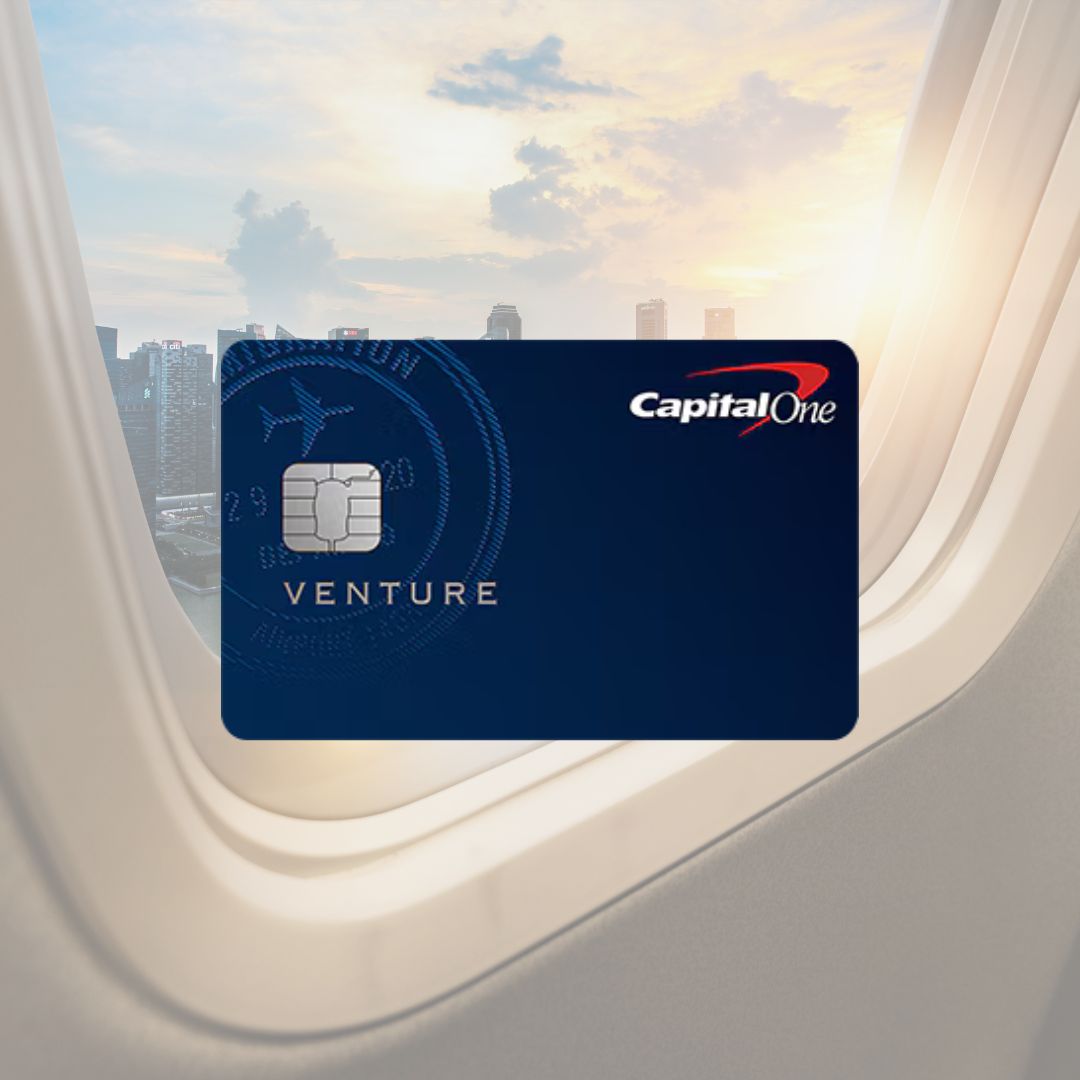
What sets this card apart is its simplicity. You earn 2 miles on every single purchase with no categories to track or spending limits to worry about. When you book hotels, vacation rentals, and car rentals through Capital One Travel, you’ll get 5 miles per dollar spent.
Best: Rewards on everyday spending
Rewards: 2x-5x points
Credit score needed: Good – Excellent
Annual fees: $95
Pros
- Earn 5X points on travel booked through Capital One Travel (hotels, vacation rentals, rental cars).
- Earn 2X points on all other purchases, with no limits.
- Get 75,000 points (worth $750 in travel) after spending $4,000 in the first 3 months.
- Use points to pay for travel or transfer to over 15 travel partners.
- TSA PreCheck or Global Entry: Get up to $120 back for the application fee.
- No point expiration and no cap on how many you can earn.
- $50 travel experience credit when booking through the Lifestyle Collection.
Cons
- Some cards offer 2% cash back with no annual fee.
- Few U.S. airline transfer partners, which limits some travel options.
- Doesn’t include airport lounge access like some premium cards.
Capital One Venture X Rewards Credit Card

A premium travel card that delivers exceptional value. This card is built for serious travelers who want maximum rewards and premium benefits.
The standout feature is the complimentary access to over 1,300 airport lounges worldwide, including Capital One’s own lounges and partner locations.
This benefit alone can be worth hundreds of dollars per year if you travel frequently.
Best: For travel benefits
Rewards: 2x-10x points.
Credit score needed: Excellent
Annual fees: $395
Pros
- Exceptional earning rates on travel bookings (10x hotels/rentals, 5x flights)
- Strong 2x rate on all other purchases means no category to worry about
- Huge 75,000-mile welcome bonus worth $750
- $300 annual travel credit significantly reduces the effective annual fee
- 10,000 anniversary bonus miles are worth $100 each year
- Access to 1,300+ airport lounges worldwide
- Up to $120 Global Entry/TSA PreCheck credit
- $100 hotel experience credit for premium bookings
- Flexible mile redemption options, including statement credits
- Can transfer miles to 15+ airline and hotel partners
- No foreign transaction fees
- Premium travel protections and insurance
Cons
- High $395 annual fee requires active use of benefits to justify
- The highest earning rates are only available through the Capital One Travel portal
- Limited domestic airline transfer partners compared to some competitors
- It may not be worth it if you prefer booking directly with airlines/hotels
- Benefits are heavily travel-focused, so non-travelers won’t find much value
- Some premium hotel benefits require booking specific collections
- Portal booking may sometimes have limited availability or higher prices
Barclaycard Reward Credit Card
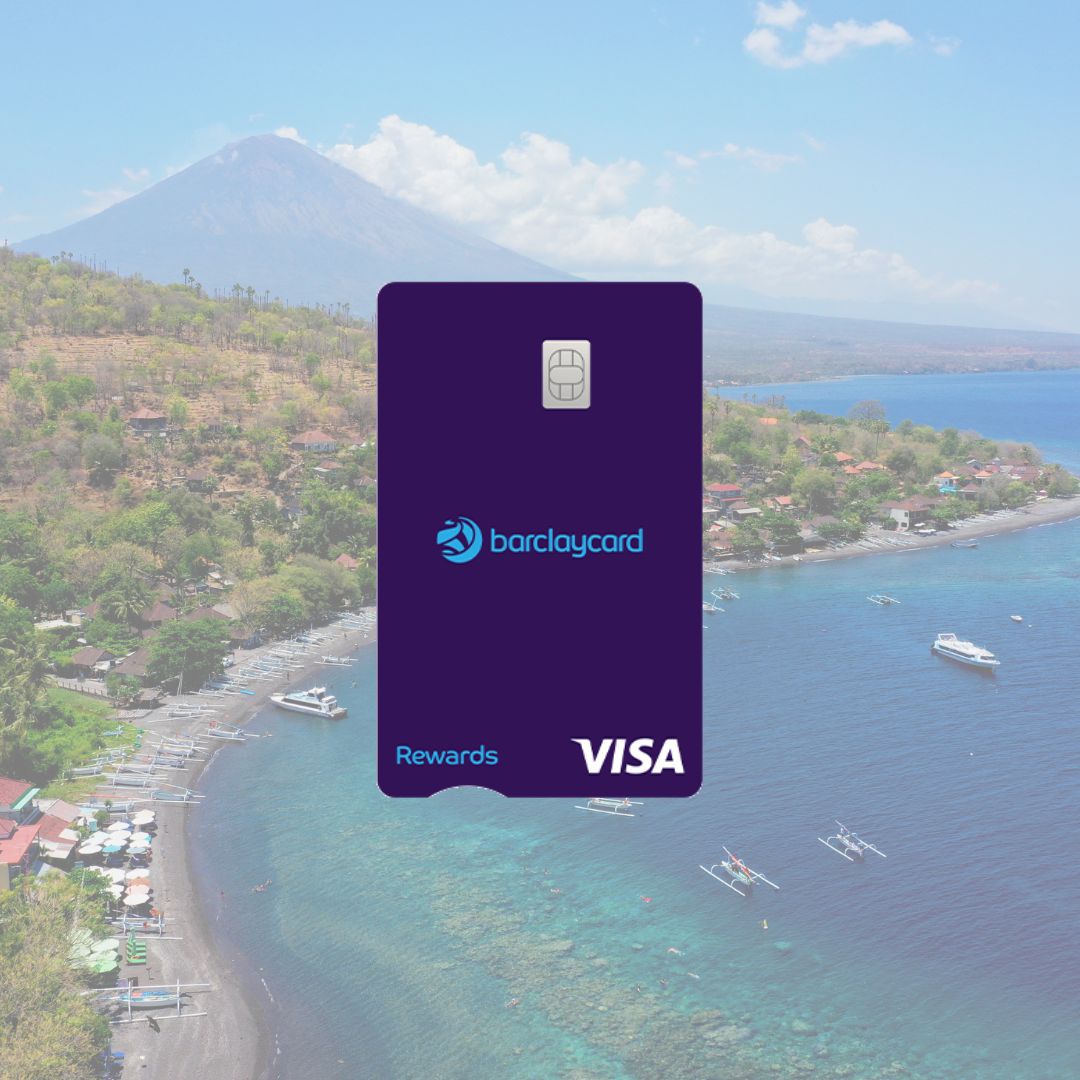
This card makes the most sense for UK residents who travel internationally several times per year and want a simple, no-fee way to earn rewards on their spending. It’s particularly good for people who prefer cashback over points, don’t want to manage complex bonus categories.
Best: For UK residents.
Rewards: 0.5% cashback.
Credit score needed: Fair
Annual fees: $30
Pros
- No foreign transaction fees anywhere in the world
- Simple, consistent cashback rate on all purchases
- No annual fee to worry about
- Visa’s competitive exchange rates for international purchases
- Additional cashback opportunities through retailer partnerships
- 24/7 fraud protection
- Quick online application with instant decision
- Free additional cardholder option
- Access to exclusive event tickets and experiences
Cons
- The standard 0.25% cashback rate is relatively low compared to specialized travel cards
- High 28.9% APR if you carry a balance
- Strict eligibility requirements, including a £20,000 minimum income
- Must be fee-free only if you pay off international spending in full each month
- Limited transfer partners compared to points-based travel cards
- No premium travel perks like lounge access or travel insurance
- Cannot have had a Barclaycard in the past 6 months
- Cashback doesn’t apply to cash withdrawals, balance transfers, or gambling transactions.
Chase Sapphire Reserve®

For a $550 annual fee, this card delivers premium travel benefits that can easily pay for itself, although the annual fee is costly.
The card gives you big points on travel and dining, valuable travel protections, and access to airport lounges around the world.
You also get a $300 annual travel credit, a large welcome bonus, and 50% more value when using points for travel through Chase Travel℠. If you use it right, the benefits can outweigh the fee.
Best: For Bonus rewards.
Rewards: 1x-10x points.
Credit score needed: Excellent
Annual fees: $550
Pros
- 10x points on hotels and car rentals through Chase Travel (after the $300 travel credit is used)
- 5x points on flights through Chase Travel
- 3x points on other travel and dining
- $300 yearly travel credit
- 60,000-point welcome bonus after spending $5,000 in the first 3 months (worth $900 through Chase Travel)
- Airport lounge access (1,300+ lounges with Priority Pass™ Select)
- 1:1 points transfer to top airlines and hotels
- Great travel insurance
- No foreign transaction fees
Cons
- Very high $550 annual fee
- $75 fee for each additional user
- Need excellent credit to qualify
- Must spend on travel to maximize benefits
- Best rates require booking through the Chase portal
Ink Business Preferred® Credit Card
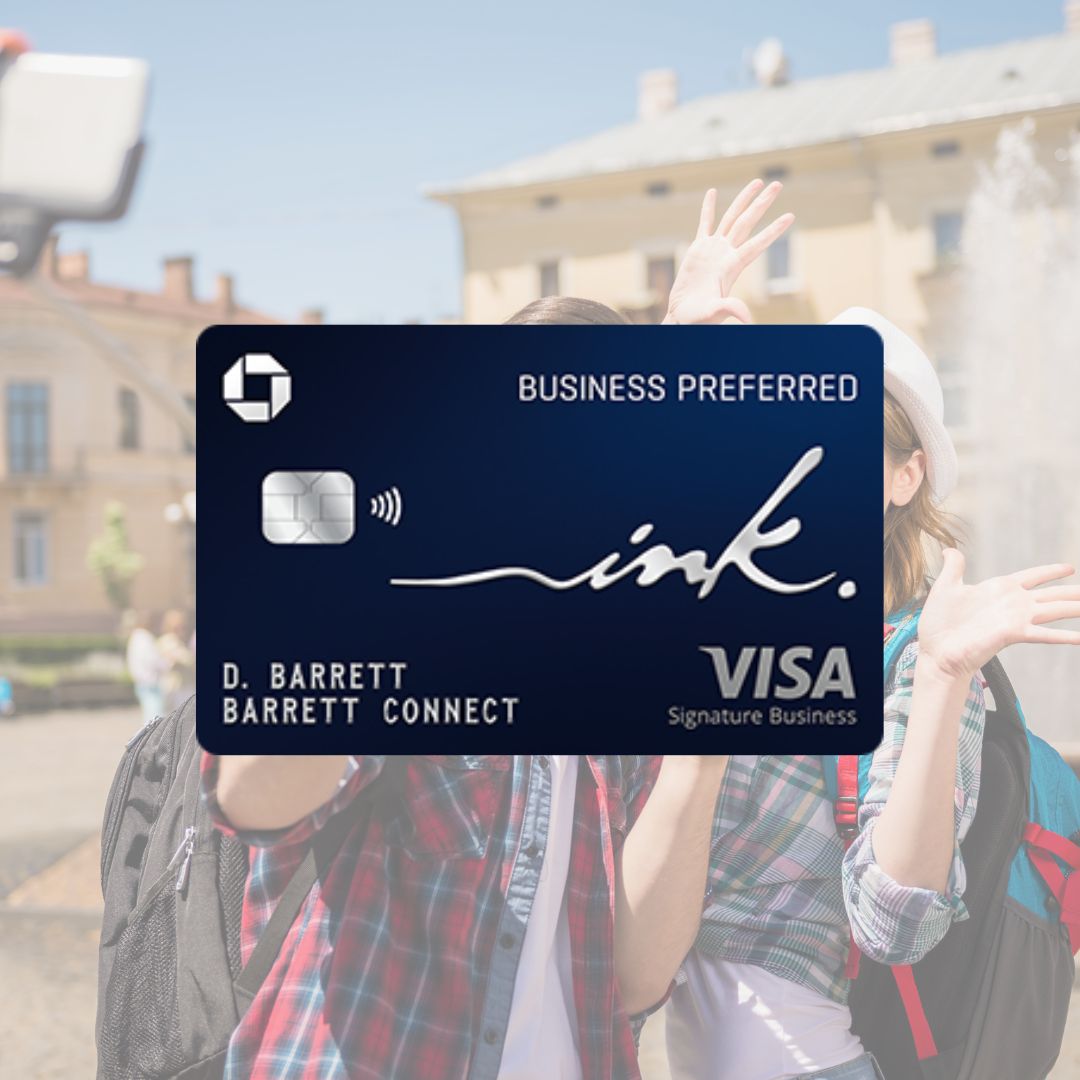
This card is designed for businesses that spend heavily on travel and common business expenses.
You’ll earn 3 points per dollar on travel and select business categories like shipping, online advertising, and phone services, up to $150,000 per year.
Everything else earns 1 point per dollar with no earning limits.
Best: For small business owners
Rewards: 1x-3x points.
Credit score needed: Excellent
Annual fees: $95
Pros
- Earn 3 points per $1 on travel and select business expenses (up to $150,000 per year).
- Earn 1 point per $1 on all other purchases with no limit.
- Big welcome bonus: 90,000 points after spending $8,000 in the first 3 months.
- Points are worth 25% more when used for travel through Chase.
- Points can also be transferred to airlines and hotels.
- No foreign transaction fees.
- Employee cards cost nothing extra.
- Travel protections like trip cancellation and rental car coverage.
- Purchase Protection covers new items for 120 days against damage or theft.
Cons
- $95 annual fee
- Earning a cap of $150,000 per year on bonus categories
- Low 1x points rate on non-bonus spending
- Bonus categories may not fit all business types
- Need to spend $8,000 in 3 months for the welcome bonus
Wells Fargo Autograph Journey℠ Card
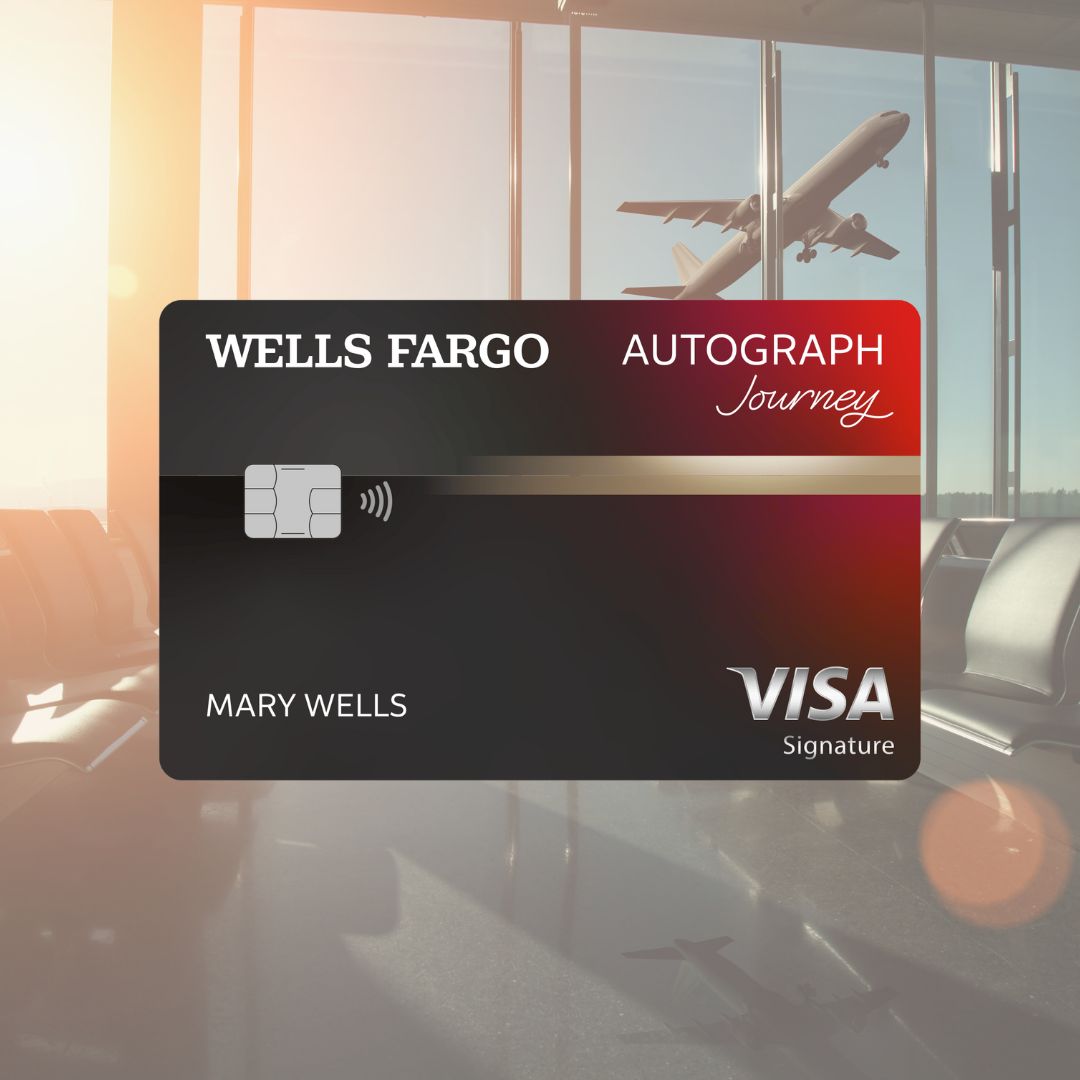
This card makes travel spending rewarding without forcing you to use complicated booking portals.
You’ll earn 5 points per dollar on hotels, 4 points on airlines, and 3 points on restaurants and other travel, all when booking directly.
What sets this card apart is its flexibility. You can book wherever you want and still earn top rewards, plus you get a $50 annual airline credit that covers more than half the $95 annual fee.
Best: For earning travel rewards
Rewards: 1x-5x points.
Credit score needed: Good – Excellent
Annual fees: $95
Pros
- Excellent rewards on hotels (5x) and airlines (4x)
- Freedom to book directly with preferred providers
- Good welcome bonus worth $600
- Low $95 annual fee
- $50 annual airline statement credit
- Strong travel and cell phone insurance coverage
- 24/7 concierge service
Cons
- Limited transfer partners compared to other cards
- No TSA PreCheck/Global Entry credit
- Only 1x points on everyday purchases
- Few domestic airline transfer options
- Newer card with a smaller partner network
Chase Freedom Unlimited®
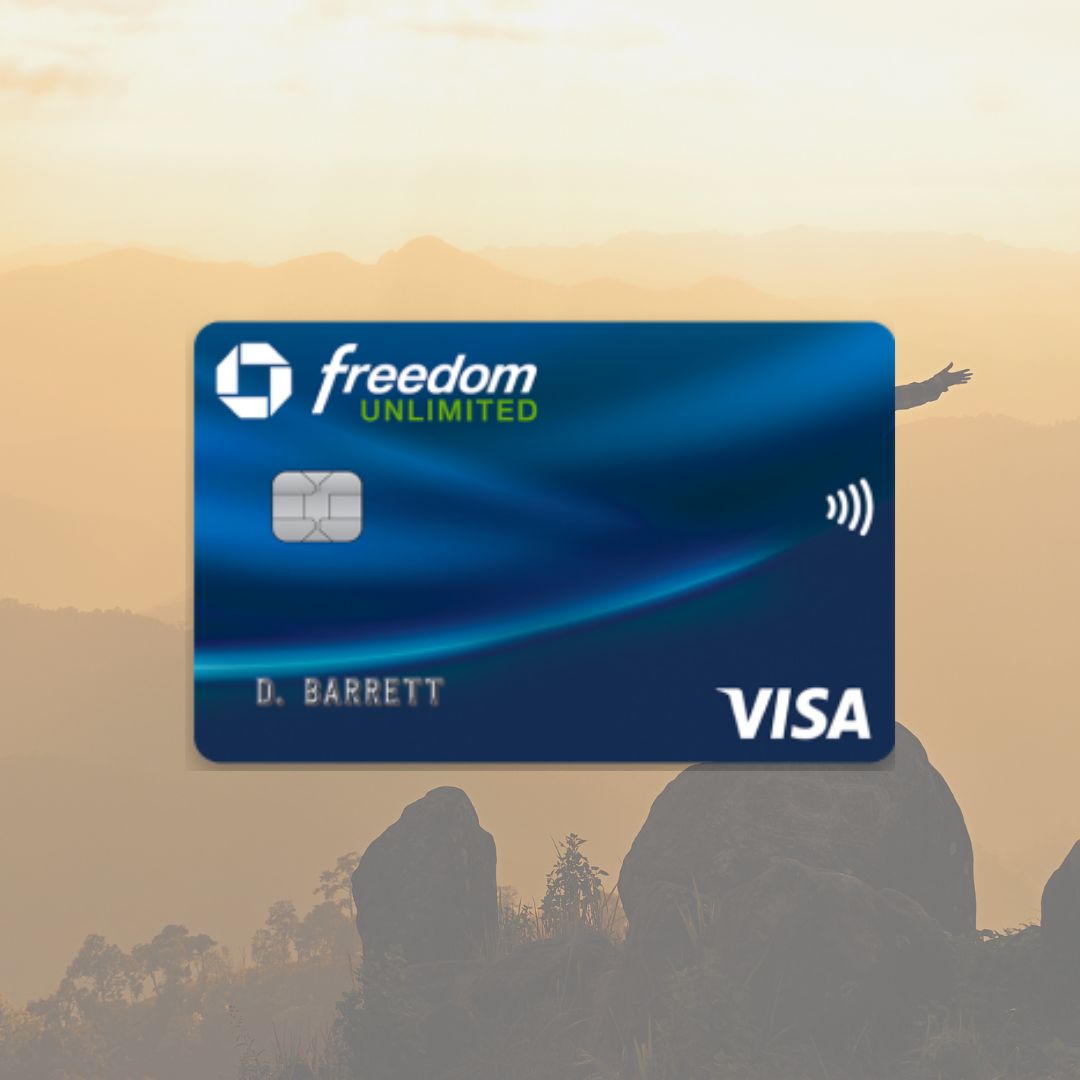
And lastly, the Chase Freedom Unlimited® proves that you don’t need to pay an annual fee to get solid travel rewards, making it one of the best budget-friendly travel cards.
This no-fee card offers a simple but effective approach to travel rewards. You’ll earn 5% cash back when booking travel through Chase’s portal, 3% back on dining and drugstore purchases, and 1.5% on everything else.
Your cash back never expires and can be redeemed as statement credits or direct deposits. Plus, if you later get a Chase Sapphire card, you can transfer these rewards for even more travel value.
Best: For budget-conscious travelers.
Rewards: 1.5%-5% cashback.
Credit score needed: Good – Excellent
Annual fees: $0
Pros
- No annual fee
- Easy $200 welcome bonus ($500 spending requirement)
- 5% back on travel through the Chase portal
- 3% back on dining and drugstores
- 1.5% back on everything else
- 0% intro APR for 15 months
- Cash back never expires
- Can transfer rewards to Chase Sapphire cards for more value
Cons
- Limited travel perks compared to premium cards
- Has foreign transaction fees (not ideal for international travel)
- Must book through the Chase portal for the best travel rewards
- No travel insurance or airport lounge access
- Lower earning rates compared to specialty travel cards
How to Choose a Travel Credit Card

Source: Unsplash
Choosing the right travel credit card depends on how often you travel, where you spend the most, and what kind of rewards matter to you. Here’s how to find the card that best fits your lifestyle.
Consider How You Travel
Start by thinking about how and how often you travel. If you travel internationally several times a year, a card with no foreign transaction fees and lounge access like the Capital One Venture X or Chase Sapphire Reserve might be worth the higher annual fee.
For occasional travelers or those who mostly stay domestic, a lower-cost option like the Chase Freedom Unlimited or Capital One Venture Rewards may offer enough value without the premium cost.
Look at Reward Categories
Next, see where you spend most often. If dining and groceries are your biggest monthly expenses, the American Express Gold Card will reward you the most.
If you want a flat rate on everything without juggling categories, the Capital One Venture cards are simple and rewarding.
On the other hand, if you book a lot through a travel portal, cards like Chase Sapphire Preferred or Citi Strata Premier offer boosted rewards when using their travel platforms.
Think About Sign-Up Bonuses
If you’re planning a big purchase or trip soon, a card with a generous welcome offer could give you hundreds of dollars in free travel.
Cards like Ink Business Preferred and Capital One Venture X offer large sign-up bonuses, but require high initial spending.
Make sure the spending requirement is something you can meet comfortably.
Evaluate Annual Fees
Cards with higher annual fees typically offer more benefits, but those benefits only make sense if you use them.
If you won’t take advantage of lounge access, travel credits, or partner transfers, a high-fee card like the Chase Sapphire Reserve may not be worth it.
A card like the Citi Strata Premier or Wells Fargo Autograph Journey offers good rewards at a modest fee. If you’re fee-averse, Chase Freedom Unlimited gives solid value with no annual cost.
Check for Extra Perks
Extras like TSA PreCheck credits, travel insurance, and airport lounge access can make travel smoother.
Cards such as the Venture X and Chase Sapphire Reserve offer premium travel protections and experiences that justify their fees if you travel often.
If you’re a casual traveler, perks like cell phone protection or hotel discounts, offered by cards like the Wells Fargo Autograph Journey or Citi Strata Premier, can be more useful.
Match the Card to Your Credit Score
Most top travel cards require good to excellent credit. Cards like the Barclaycard Reward Credit Card are more forgiving and offer value for UK travelers with fair credit, while premium cards like the Chase Sapphire Reserve or Capital One Venture X need excellent credit. Make sure you check your score before applying to avoid a hard inquiry without approval.
Pros and Cons of Travel Credit Cards

Source: Unsplash
Travel credit cards are a great tool for making your trips more rewarding.
They offer points or miles on your spending, save you money with credits or perks, and often include travel protections.
But like any financial product, they come with both advantages and drawbacks.
Pros of Travel Credit Cards
Earn rewards on everyday and travel spending
Travel credit cards let you earn points or miles for your purchases. Many cards give extra rewards on travel, dining, and even groceries.
Some, like the Capital One Venture Rewards Credit Card, offer a flat 2x rate on all spending, while others, like the Citi Strata Premier℠, give 3x on categories like flights, gas, and groceries.
Big welcome bonuses
Most travel cards offer a large sign-up bonus if you meet the initial spending requirement. For example, the Chase Sapphire Preferred® Card gives 60,000 points, and Capital One Venture X gives 75,000 miles, both worth hundreds in travel.
Airport perks and travel credits
Premium cards often include lounge access, like the Capital One Venture X and Chase Sapphire Reserve®. Some cards also offer annual travel credits or reimburse TSA PreCheck/Global Entry fees, adding real value for frequent flyers.
No foreign transaction fees
Nearly all travel cards waive foreign transaction fees, making them ideal for international travel. This means you won’t pay extra when making purchases abroad.
Flexible redemption and transfer options
Many cards let you redeem points for travel directly or transfer them to airline and hotel partners. This flexibility can increase the value of your points, especially when booking business or first-class flights.
Travel protections and insurance
Some cards offer built-in travel insurance, rental car coverage, trip cancellation protection, and even cell phone insurance, giving you peace of mind while traveling.
Cons of Travel Credit Cards

Source: Unsplash
Annual fees
Most travel cards charge a yearly fee. Basic cards like Chase Sapphire Preferred® charge $95, but premium cards like Chase Sapphire Reserve® go up to $550. You need to use the benefits often enough to justify the cost.
Higher spending requirements
To earn the welcome bonus, you typically have to spend thousands within a few months. For example, the Amex Gold Card requires $6,000 in 6 months to get the bonus, which might not be practical for all users.
Booking restrictions
Many top rewards are only available when booking through a card’s travel portal. This can limit your options or result in higher prices compared to booking directly.
Limited transfer partners
Some cards don’t have many travel partners, or the ones they have may not be useful for your preferred airlines or hotels. Cards like Wells Fargo Autograph Journey have fewer partners than Amex or Chase.
Complicated reward structures
Cards like the American Express® Gold Card come with several credits and bonuses that require activation or can only be used at specific retailers. This adds a layer of complexity if you prefer simplicity.
Foreign transaction fees on budget cards
Some lower-tier cards still charge foreign transaction fees, which can add up quickly when traveling abroad. This makes them less ideal for international trips.
Conclusion
Now you have different types of travel cards to choose from, each with its benefits and costs. The best card for you depends on how you travel, where you spend your money, and what benefits matter most to you.
If you’re new to travel cards, start with something simple like the Chase Sapphire Preferred or Chase Freedom Unlimited.
If you travel often and want premium perks, cards like the Capital One Venture X or Chase Sapphire Reserve offer great value despite their higher fees. For everyday spending, the American Express Gold Card or Citi Strata Premier can help you earn rewards on dining and groceries, too.
Remember to consider the annual fee and ensure you’ll utilize enough benefits to make it worthwhile.
Frequently Asked Questions
What Is the Best Travel Credit Card for Beginners?
The Chase Sapphire Preferred® Card is great for beginners. It offers strong rewards, flexible points, and travel protections with a moderate $95 annual fee.
Which Card Is Best for Dining and Everyday Spending?
The American Express® Gold Card rewards you with 4X points at restaurants and U.S. supermarkets. It’s perfect if you spend a lot on food, but it has a higher $325 annual fee.
Are There Good Travel Cards With No Annual Fee?
Yes, the Chase Freedom Unlimited® has no annual fee and still offers solid rewards like 5% back on travel booked through Chase and 3% on dining.
Which Card Offers the Best Airport Lounge Access?
The Capital One Venture X Rewards Credit Card gives access to over 1,300 lounges worldwide and comes with valuable travel credits, making it ideal for frequent travelers.
How Do I Choose the Right Travel Card for Me?
Consider how often you travel, your spending habits, annual fees, and the rewards you want. For example, pick premium cards if you travel often and want perks, or choose no-fee cards if you travel less or want simplicity.


